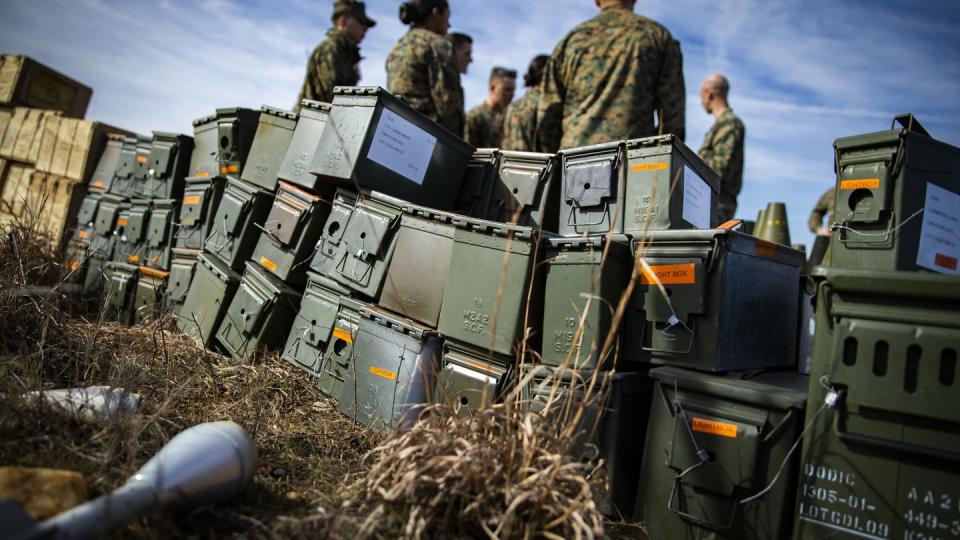Marines pass full financial audit, a first for any US military branch
The U.S. Marine Corps passed a full financial audit for the first time, with the service announcing Friday its fiscal 2023 financial audit received an “unmodified audit opinion” after a rigorous two-year review.
The milestone — something the Defense Department and the other armed services still have not achieved — comes after almost two decades of trying to prepare the Corps’ records and several failed audits along the way.
During this two-year audit, the Marine Corps had independent third-party auditors from Ernst and Young vet the value of all its assets listed on financial statements. The Corps also had to prove that every single item existed and was where the service said it was.
Gregory Koval, the assistant deputy commandant for resources, told reporters the audit team made more than 70 site visits in the U.S. and around the world. In these visits, they checked more than 7,800 real property assets such as land and buildings; 5,900 pieces of military equipment; 1.9 million pieces of non-ammunition supplies, such as spare parts; and 24 million items of ammunition, some of which are stored at Army and Navy facilities.
If a vehicle wasn’t where it was listed as being because it was out conducting operations, or a piece of ammunition wasn’t there because it had already been shot in a recent exercise, the Corps had to show documentation or photos of that, too, in order to explain discrepancies.
Koval said the final financial report states the Marine Corps passed its audit but still has some areas where it can improve.
Lt. Gen. James Adams, the deputy commandant for programs and resources, said one area of focus is automating processes. Today, there are disparate systems where data must be manually moved from one system to another, introducing the opportunity for error. The service is moving toward integrated, automated systems that would avoid human error in sharing information between human resources and financial data systems, for example.

Adams said that passing the audit now will make all future ones more manageable. This last audit asked a third party to validate the existence and the value of every single thing the Marines own, which required significant historical research, he explained.
Subsequent audits, on the other hand, will be able to assume the past information is correct and therefore only cover “from this point forward,” instead asking Marines to prove information related to that fiscal year’s financial transactions.
Adams said the Corps got close to completing past audits in a single fiscal year, but because of the immense historical research, they couldn’t get the audit completed and over the finish line in a single year. For the fiscal year 2023 audit, the service requested an extension, which could prove to be a model for the other services.
“It was a goal of the commandant of the Marine Corps to pass the audit because he wants to show the credibility of the Marine Corps back to the Congress and the taxpayer,” Ed Gardiner, the assistant deputy commandant for programs and resources, told reporters.
In addition to having more time, this audit also used the military’s new general ledger software, Defense Agencies Initiative, in which auditors had confidence, according to Gardiner.
Gardiner explained the services were, by law, supposed to start financial audits in the 1990s, but the Marine Corps didn’t begin producing statements in preparation for an audit until 2006. The first audit in 2010 showed plenty of room for improvement, he said. In late 2013, the Marines announced they had passed a limited-scope audit for fiscal year 2012 — but in March 2015, a number of financial and oversight leaders reported the results were unreliable and the clean pass would be rescinded.
In 2017, the Marine Corps began conducting full financial statement audits.
The 2023 full financial statement audit was conducted to the highest standards, Gardiner said, with the Ernst and Young team not only being audited themselves by a peer-review team but also by the Pentagon’s inspector general team.
“We’ve been all the way to the end of the process, and we have lessons learned that we can share with the rest of the department,” he said, adding the Marine Corps hopes these lessons “can be an accelerant for the rest of the department.”
Pentagon Comptroller Michael McCord made similar remarks in November 2023, when the Pentagon failed its sixth audit since 2018.
Noting the Marines’ extension, McCord said that “we are very focused on it as a test case for the department and the larger services.”
“Whatever results of that may be when we get the auditor’s final opinion, I want to commend the USMC and, in particular, (Marine Corps Commandant Gen.) Eric Smith for their leadership and effort,” McCord added.

